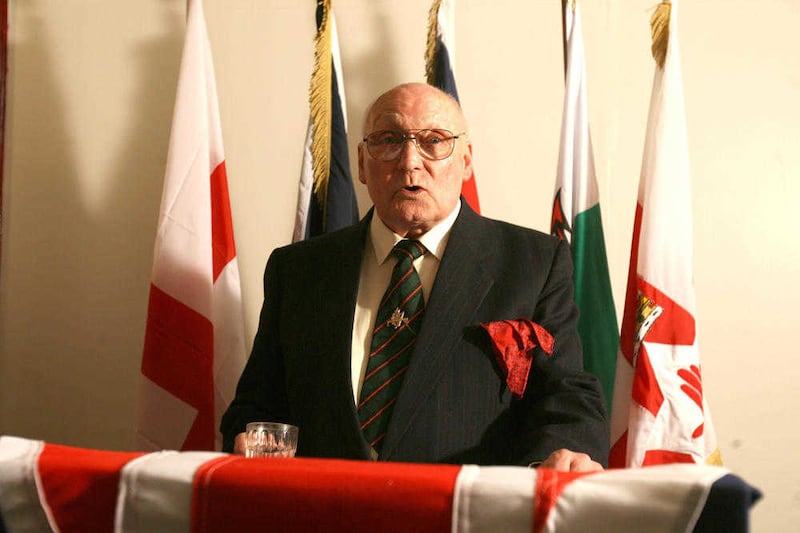George Eastham is likely to be the only one of the 1966 World Cup winners better remembered for an arguably more significant contribution to the English game.
The former Newcastle, Arsenal and Stoke inside forward, who has died at the age of 88, left a far-reaching legacy as the man who battled against ‘slavery contracts’.
A second generation England international, following in the footsteps of his once-capped father George Senior, Eastham was the only Gunners player in Sir Alf Ramsey’s World Cup-winning squad.
Yet he did not feature in the tournament, the last of his 19 caps coming ahead of the finals as he scored against Denmark in July 1966.

It was in the Potteries where Eastham, whose uncle Harry Eastham was also a professional footballer with Liverpool and Tranmere, claimed his only piece of club silverware, scoring the winner in the 2-1 League Cup final victory over Chelsea in 1972 to give Stoke their first ever major trophy.
That contribution may well be remembered most fondly by Stoke supporters – and recalled with anguish by those in blue that day – but it was his off-field work which set Eastham apart.
For his long-lasting imprint on the English game, you must travel back to 1959 and the north east.
Born in Blackpool on September 23, 1936, Eastham began his senior football career in Northern Ireland playing for semi-professional side Ards, where his father, a former Bolton and Blackpool inside forward, was player-manager.
George Senior had headed there with his family to take up the role in 1953 and both father and son made their debuts in the same match, the opening day of the 1953-54 season.
Sixteen-year-old Eastham’s chance came because of injuries to first-team players, with his father reportedly telling him: “I’m putting you in. Not that you’re ready.”

But Ards won that Ulster Cup tie against Portadown 5-3 and Eastham continued to make progress. Newcastle came calling for the talented youngster and he made the move to St James’ Park in 1956.
His form on the pitch was more than adequate, but discontent off it would lead to an acrimonious exit three years down the line.
With relations between club and player at rock bottom due to Eastham’s desire to find other work to supplement his football earnings being rebuffed by Newcastle, he requested a move south – to join Arsenal – but it was rejected by the Magpies.
At the time, Newcastle were well within their rights to do just that under the retain-and-transfer rule – or the ‘slavery’ rule as it became known – whereby a club could reject a player’s transfer even if his contract had expired.
So Eastham was in limbo. He had gone on strike at Newcastle but could not join another club. Off to London he went, selling cork to earn a living and earning more than he had been playing football.

Seven months passed before Newcastle relented and a transfer to Arsenal was completed, but Eastham was at the forefront of the legal fight by this point, leading the players’ revolt against the ‘slavery’ rule alongside the Professional Footballers’ Association.
“Newcastle were probably hoping that after I eventually signed for Arsenal the dispute over the retain-and-transfer system would fall away,’ Eastham said in Jon Henderson’s book ‘When Footballers Were Skint’.
“But the PFA were looking to me to be the man to take the fight forward, to bring an end to the system.”
He added in Jon Spurling’s ‘Rebels for the Cause’: “Our contract could bind us to a club for life. Most people called it the ‘slavery contract’.
“We had virtually no rights at all. People in business or teaching were able to hand in their notice and move on. We weren’t. That was wrong.”
Having gone on strike, Eastham did not gain personally from his courtroom battle with Newcastle, but his fight saw the retain-and-transfer regulations altered in favour of players.
He was the Jean-Marc Bosman of his day. Proof of his impact and influence came in December 2020 when, 25 years after the introduction of the Bosman ruling which allowed players to move freely at the end of their contracts, Eastham was honoured alongside the Belgian at a FIFPro event – recognised for the part he played in the domestic freedom of movement for players in England.
Finally free to play for Arsenal, Eastham set about making up for lost time, scoring twice on his debut in a 5-1 win over Bolton.
Later that season and, with the aforementioned court case still rumbling on in the background, Eastham was pelted with fruit and hit with a chorus of ‘Judas’ chants as he returned to Newcastle, silencing the locals with a late equaliser in a 3-3 draw.
He would reject his next contract offer at Arsenal, still keen to get paid what he felt he was worth.

“The problem was that fans weren’t used to ‘player power’ in England,” he said in ‘Rebels for the Cause’.
“The prevailing thought was, ‘You don’t mess the Arsenal around’. I wasn’t messing anyone around, actually.
“At heart, most people still thought we should put up and shut up. My view was that we’d been slaves for too long and I was just standing up for myself.”
He would end up wearing the captain’s armband at Arsenal under Billy Wright, but his time at Highbury was winding to a close by the time of the 1966 World Cup on home soil.
Eastham had already done enough to earn 19 senior England caps and a place in Ramsey’s squad.

It would be a disappointing summer on a personal level, however, with Eastham playing not a single minute as the Three Lions roared to World Cup glory.
He would not even receive a winners medal until 2007 when FIFA ruled they would be awarded retrospectively to non-playing squad members of previous finals.
Stoke was Eastham’s next stop, moving to Staffordshire that same summer, staying for seven full seasons and finally getting his day in the Wembley sun by tucking home the winner for League Cup success in 1972.
He wound down his playing days in South Africa, moving into the sportswear business and running the South African Arsenal Supporters’ Club for some years.








